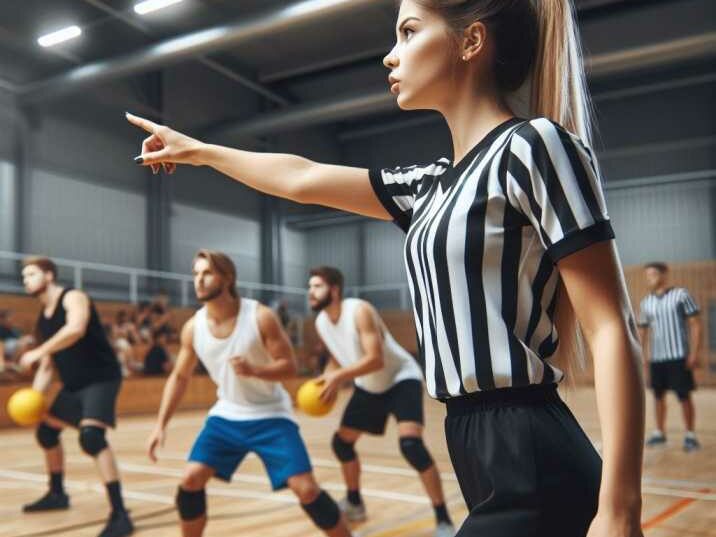Introduction:
Table of Contents
Dodgeball is an exciting and dynamic game that requires skill, strategy, and teamwork. As players compete to eliminate opponents by hitting them with thrown balls, the role of the referee becomes paramount in ensuring fair play and maintaining order on the court. In this article, we’ll delve into the essential responsibilities of the referee in dodgeball games, highlighting their importance for both players and spectators.

1. Understanding the Role of the Referee:
In any dodgeball match, the referee serves as the impartial authority responsible for enforcing the rules of the game and making critical decisions to ensure fair play. Referees must possess a thorough understanding of the official rules and regulations governing dodgeball to effectively carry out their duties.
Enforcing Game Rules:
One of the primary responsibilities of the referee is to enforce the rules of dodgeball throughout the match. This includes monitoring player conduct, ensuring proper ball handling, and adjudicating disputes that may arise during gameplay.
Promoting Fair Play:
Fair play is at the heart of any sporting event, and the referee plays a crucial role in upholding this principle in dodgeball. By maintaining impartiality and consistency in their decisions, referees help create a level playing field for all participants.
Ensuring Player Safety:
The safety of players is of paramount importance in dodgeball, and referees are tasked with ensuring that matches are conducted in a safe and controlled manner. This includes enforcing safety protocols, such as prohibiting headshots and monitoring player behavior to prevent reckless or dangerous actions.
2. Key Duties of the Referee:
In addition to enforcing the rules and promoting fair play, referees in dodgeball have several other important duties that contribute to the smooth operation of the game.
Starting and Ending Matches:
Referees are responsible for starting matches on time and ensuring that all players are ready to begin play. They also have the authority to end matches if necessary, such as in the event of severe weather or other emergencies.
Managing Substitutions:
During a dodgeball match, teams may need to make substitutions due to injuries or strategic decisions. Referees oversee the substitution process to ensure that it is carried out smoothly and in accordance with the rules.
Resolving Disputes:
Disputes between players or teams are not uncommon in competitive sports, and referees must be prepared to resolve such conflicts quickly and decisively. This may involve consulting with other officials or reviewing video footage to make informed decisions.
3. The Importance of Referees for Spectators:
While players rely on referees to ensure a fair and safe playing environment, spectators also benefit from the presence of officials at dodgeball matches.
Providing Clarity and Transparency:
Referees help provide clarity and transparency to spectators by explaining calls and rulings as they occur during the game. This enhances the viewing experience and fosters a greater understanding and appreciation of the sport.
Maintaining the Integrity of the Game:
By upholding the rules and standards of dodgeball, referees contribute to the integrity of the sport and help maintain its reputation as a fair and competitive endeavor. Spectators can have confidence in the outcome of matches knowing that they were officiated impartially and professionally.

Table of Information:
| Role of the Referee in Dodgeball | Details |
|---|---|
| Enforcing Game Rules | Monitor player conduct and ensure adherence to rules. |
| Promoting Fair Play | Maintain impartiality and consistency in decisions. |
| Ensuring Player Safety | Enforce safety protocols and prevent reckless actions. |
| Starting and Ending Matches | Begin matches on time and manage match duration. |
| Managing Substitutions | Oversee the substitution process during matches. |
| Resolving Disputes | Quickly and decisively address conflicts between players. |
| Providing Clarity and Transparency | Explain rulings to spectators for a better understanding. |
| Maintaining the Integrity of the Game | Uphold the rules and standards of dodgeball. |
Conclusion:
In conclusion, the role of the referee in dodgeball is indispensable, serving to uphold the integrity of the game, promote fair play, and ensure the safety of all participants. From enforcing rules and resolving disputes to providing clarity for spectators, referees play a vital role in the success and enjoyment of dodgeball matches.
FAQs:
- Q: Can players dispute the referee’s decisions during a dodgeball match? A: While players may express disagreement with a referee’s call, it is ultimately the official’s decision that stands.
- Q: How are referees trained for officiating dodgeball matches? A: Referees undergo comprehensive training programs to familiarize themselves with the rules and protocols of dodgeball officiating.
- Q: Are referees responsible for enforcing player conduct off the court as well? A: While referees primarily focus on in-game conduct, they may address egregious behavior that occurs off the court if it impacts the integrity of the game.
- Q: What qualifications are required to become a dodgeball referee? A: Qualifications may vary depending on the level of competition, but referees typically undergo certification programs and receive ongoing training and evaluation.
- Q: How do referees communicate with players during a match? A: Referees use verbal commands, hand signals, and whistle blows to communicate with players and convey important information during a match.


